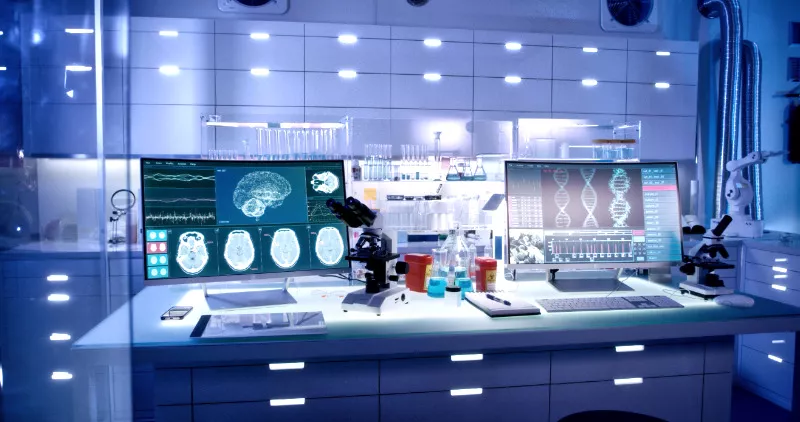The COVID-CNS study analysed samples from over 800 patients hospitalised with COVID-19 from across England and Wales, half of whom with new neurological conditions. Here researchers measured brain injury markers, serum inflammatory proteins (cytokines), antibodies, and brain (neuroglial) injury proteins.
The analysis of these shows that during the acute phase (when symptoms are developing quickly) there is production of key inflammatory proteins and brain injury markers, but surprisingly on-going robust biomarker evidence of brain (neuroglial) injury in COVID-19 even months after discharge from hospital. Crucially this was more prominent in patients with neurological dysfunction in the acute phase of the illness, and continued in the recovery phase in patients who had suffered acute neurological complications.
The inflammatory markers are associated with abnormal immune responses in the acute phase of the disease, and the researchers suggest that these may represent targets for therapy for COVID-19 and other infections which cause acute brain dysfunction.
The findings represent a major output from the University of Liverpool and King’s led COVID-19 Clinical Neuroscience Study (COVID-CNS) and also involves scientists from the ISARIC4C consortium, The Pandemic Institute and the NIHR BioResource.
What is COVID-CNS?
The COVID-CNS study is a UKRI-funded collaborative study jointly led by experts in neuroscience and psychiatry based at the University of Liverpool and King’s College London, and is part of our COVID-19 BioResource. The study recruited patients, from across England and Wales, who were either:
- admitted to hospital with COVID-19 and had neurological or neuropsychiatric complications,
- admitted to hospital but without experiencing these symptoms,
- admitted to hospital with neurological or neuropsychiatric complications after receiving a COVID-19 vaccination,
- or healthy controls (without COVID-19).
The aim is to understand how these complications occur, why they occur in some patients and not others, and to develop strategies to prevent and treat them.
Professor Benedict Michael, Principal Investigator and Director of the University of Liverpool’s Infection Neuroscience Laboratory and Honorary Consultant Neurologist, The Walton Centre NHS Foundation Trust said:
"During the COVID-19 pandemic it became apparent that neurological complications were occurring in a significant proportion of hospitalised patients and even in those with mild COVID-19 infection.
"While some neurological ‘symptoms’ were often mild (headache and muscle aches [myalgia]), it became clear that more significant and potentially life-changing new neurological ‘complications’ were occurring, including encephalitis (brain inflammation), seizures, and stroke.
"Our study shows that markers of brain injury are present in the blood months after COVID-19, and particularly in those who have had a COVID-19-induced brain complication (e.g. inflammation, or stroke), despite resolution of the inflammatory response in the blood.
"This suggests the possibility of ongoing inflammation and injury inside the brain itself which may not be detected by blood tests for inflammation."
Professor Leonie Taams, Head of the School of Immunology & Microbial Sciences, Faculty of Life Sciences & Medicine, said:
"It was a great privilege to be part of this important cross-disciplinary research by the COVID-CNS consortium.
"By bringing together immunology, neurology and infection research, we were able to reveal a number of biomarkers that were associated with the neurological complications of COVID-19.
"This work may help set the stage for elucidating the possible underlying mechanisms of these complications."
Study co-lead, Professor Gerome Breen, Professor of Psychiatric Genetics at The Institute of Psychiatry, Psychology and Neuroscience commented:
"This study is exactly why we established COVID-CNS.
"The participation of so many patients with severe, hospitalised COVID-19 with and with brain complications means we now have the ability to develop the evidence to allow for better tests and intervention in patients with hospitalised or severe COVID-19."
This study was funded by the Medical Research Council and is supported through the NIHR BioResource.
This article was first published online on 22nd December 2023 by the University of Liverpool.
Get in touch
If you are a researcher, learn more about using the NIHR BioResource to support your work.
You can keep up to date with NIHR BioResource on Twitter and LinkedIn.



